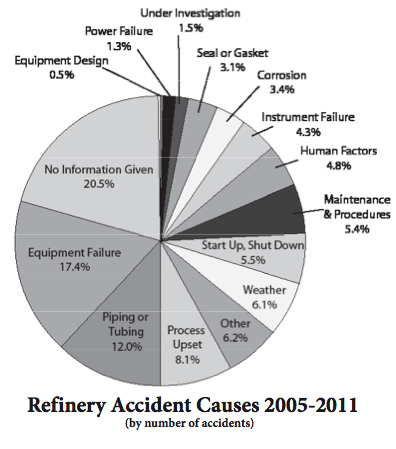Pollution from oil refinery accidents on the rise in Louisiana

The problem of toxic pollution from oil refinery accidents was on vivid display for residents of Norco, La. during the town's Christmas parade on Sunday, when the Motiva refinery spewed a flare of flame and smoky black pollution into the clear blue sky.
Flaring -- burning off of flammable gases released as a result of equipment malfunctions -- is a chronic problem at the refinery. Houston-based Motiva is a joint venture of Royal Dutch Shell and Saudi Aramco, the Saudi Arabian national oil and gas company.
But the problem isn't limited to Motiva's Norco facility, a new report shows. "Common Ground IV" produced by the Louisiana Bucket Brigade, United Steelworkers, Standard Heights Community Association, and Residents for Air Neutralization found that Louisiana's 17 refineries reported 301 accidents to the state in 2011, spilling over a million pounds of toxic chemicals into the air and another 1.3 million gallons of pollution into the state's water and soil. The chemicals released in large quantities included benzene, which is known to cause cancer, and sulfur dioxide, which triggers asthma attacks.
"Refinery managers continue to act as if they don't have an accident problem," said Anne Rolfes, Louisiana Bucket Brigade's founding director. "Until they face the facts, the oil industry, our economy, our environment and our health will suffer."
The latest figures show a significant increase in refinery accident pollution over 2010, when those same facilities released 950,750 pounds of toxic pollution to the air and another 389,135 gallons to the water and soil. Since 2005, those refineries have experienced a total of 3,339 accidents that released 24 million pounds of air pollution and 25 million gallons of water pollution.
Irving, Texas-based ExxonMobil reported the most accidents of any Louisiana refiner in 2011 -- 138 at its two facilities in Chalmette and Baton Rouge. The company earned over $41 billion in profits last year.
"ExxonMobil definitely has the financial resources to do a better job," says United Steelworkers' International Vice President Gary Beevers.
Louisiana is the third-leading refiner among the states, each year producing enough gasoline to fill up 800 million automobile gas tanks, according to the Louisiana Division of Administration.
Given that over 200,000 people live within 2 miles of Louisiana's refineries, the potential public health impact of accidents is considerable. Many refineries are located in low-income communities and communities of color. For example, the child poverty rate in the neighborhood next to Exxon Mobil's Baton Rouge, La. refinery is 45 percent.
And the pollution numbers in the report likely understate the problem, as refinery workers say that underreporting of releases by management is common. In addition, release reports are based on estimated rather than measured emissions.
The report calls on the industry to hire more full-time workers. It also recommends increased enforcement by government agencies as well as engaging workers and nearby residents in refinery inspections.
"Instead of ignoring the results of this report or doubting the accuracy of the public records on which the data is based, refiners should work with our union and the community to make these plants safer," says Beevers.
(Chart from "Common Ground IV: The Call for Cooperation to Reduce Accidents at Refineries in Louisiana.")
Tags
Sue Sturgis
Sue is the former editorial director of Facing South and the Institute for Southern Studies.
